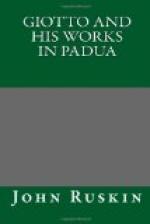“But upon inquiry, he found that all the righteous had raised up seed in Israel. Then he called to mind the patriarch Abraham,—how that God in the end of his life had given him his son Isaac: upon which he was exceedingly distressed, and would not be seen by his wife; but retired into the wilderness and fixed his tent there, and fasted forty days and forty nights, saying to himself, ’I will not go down to eat or drink till the Lord my God shall look down upon me; but prayer shall be my meat and drink.’” (Protevangelion, chap. i.)
Giotto seems here also to have followed the ordinary tradition, as he has represented Joachim retiring unattended,—but met by two of his shepherds, who are speaking to each other, uncertain what to do or how to receive their master. The dog hastens to meet him with joy. The figure of Joachim is singularly beautiful in its pensiveness and slow motion; and the ignobleness of the herdsmen’s figures is curiously marked in opposition to the dignity of their master.
* * * * *
III.
THE ANGEL APPEARS TO ANNA.
“Afterwards the angel appeared to Anna his wife, saying, ’Fear not, neither think that which you see is a spirit. For I am that angel who hath offered up your prayers and alms before God, and am now sent to tell you that a daughter will be born unto you.... Arise, therefore, and go up to Jerusalem; and when you shall come to that which is called the Golden Gate (because it is gilt with gold), as a sign of what I have told you, you shall meet your husband, for whose safety you have been so much concerned.’” (Gospel of St. Mary, chap. iii. 1-7.)
The accounts in the Protevangelion and in the Harleian MS. are much expanded: relating how Anna feared her husband was dead, he having been absent from her five months; and how Judith, her maid, taunted her with her childlessness; and how, going then into her garden, she saw a sparrow’s nest, full of young, upon a laurel-tree, and mourning within herself, said, “I am not comparable to the very beasts of the earth, for even they are fruitful before thee, O Lord.... I am not comparable to the very earth, for the earth produces its fruits to praise thee. Then the angel of the Lord stood by her,” &c.
Both the Protevangelion and Harleian MS. agree in placing the vision in the garden; the latter adding, that she fled “into her chamber in great fear, and fell upon her bed, and lay as in a trance all that day and all that night, but did not tell the vision to her maid, because of her bitter answering.” Giotto has deviated from both accounts in making the vision appear to Anna in her chamber, while the maid, evidently being considered an important personage, is at work in the passage. Apart from all reference to the legends, there is something peculiarly beautiful in the simplicity of Giotto’s conception, and in the way in which he has shown the angel entering at the window, without the least endeavour to impress our imagination by darkness, or light, or clouds, or any other accessory; as though believing that angels might appear any where, and any day, and to all men, as a matter of course, if we would ask them, or were fit company for them.




